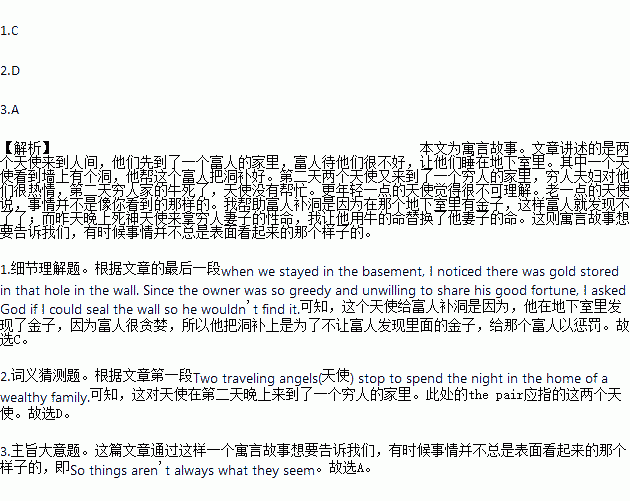题目内容
Two traveling angels(天使) stop to spend the night in the home of a wealthy family. The family was rude and refused to let the angels stay in the guest room. Instead the angels were given a space in the cold basement. As they made their bed on the hard floor, the older angel saw a hole in the wall and repaired it. When the younger angel asked why, the older angel replied, “Things aren’t always what they seem.”
The next night the pair came to rest at the house of a very poor but very hospitable(好客的) farmer and his wife. After sharing what little food they had, the couple let the angels sleep in their bed where they could have a good night’s rest. When the sun came up the next morning, the angels found the farmer and his wife in tears. Their only cow, whose milk had been their only income, lay dead in the field.
The younger angel was very angry and asked the older angel, “How could this happen? Why didn’t you watch out for the cow? The first man had everything, yet you watched over his house,” she accused. “The second family had little but was willing to share everything, and you didn’t help.”
“Things aren’t always what they seem,” the older angel replied. “When we stayed in the basement, I noticed there was gold stored in that hole in the wall. Since the owner was so greedy and unwilling to share his good fortune, I asked God if I could seal(封口) the wall so he couldn’t find it. Then last night as we slept in the farmer’s bed, the angel of death came for his wife. I asked God if the angel could take the cow instead. Things aren’t always what they seem.”
1.Why did the old angel repair the hole for the rich family?
A. Because the basement was too cold to stay in.
B. Because she wanted to save the gold for the poor.
C. Because she wanted to punish the greedy owner.
D. Because she believed that one should always be ready to offer help.
2.In Paragraph Two, “the pair” refers to ________.
A. the poor couple B. the rich couple
C. the guests D. the angels
3.The story tries to tell the readers that_________.
A. sometimes things are not what they seem
B. angels are always ready to help the poor
C. angels are always ready to help the rich
D. the young should always learn from the old

